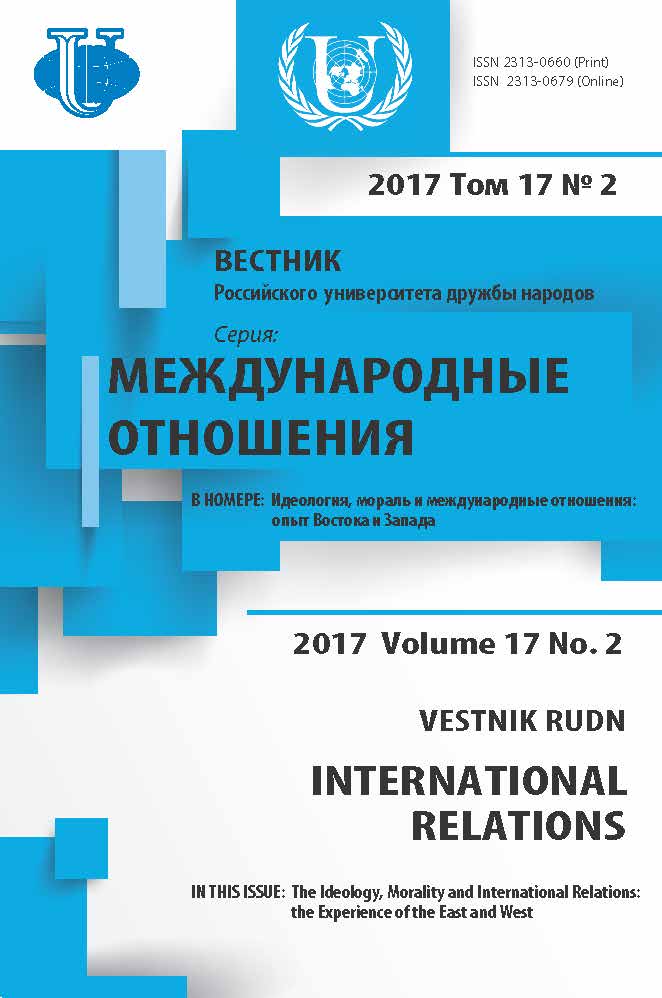Russia in G20: Factors of Success and Objectives for the Future
- Authors: Larionova M.V.1
-
Affiliations:
- Russian Presidential Academy of National Economy and Public Administration (RANEPA)
- Issue: Vol 17, No 2 (2017): The Ideology, morality and international relations: the experience of the East and West
- Pages: 349-371
- Section: INTERNATIONAL ECONOMIC RELATIONS
- URL: https://journals.rudn.ru/international-relations/article/view/16069
- DOI: https://doi.org/10.22363/2313-0660-2017-17-2-349-371
- ID: 16069
Cite item
Full Text
Abstract
Globalization and technological changes of the recent decade led to powerful transformations in the society, creating huge opportunities for economic and social development. Simultaneously these political, economic, social and technological shifts bring new challenges: enhanced mutual vulnerability of states; growing inequality; macroeconomic and financial instability; rise of terrorism; unbalanced growth of population and employment; waves of migration; increased rate of pandemic diseases diffusion; climate change and growing competition for resources. To prevent and manage the threats it is vital to ensure efficiency of the global governance system. Though lacking in legitimacy G20, set up in response to the global economic and financial crisis, has proved its efficiency in crafting and implementing consensus based decisions with a catalytic impact for global governance. Russia has a very strong track record in the G20 and it is vital to build on the success. The article reviews the G20 role in the global governance system and examines the factors of Russia’s success in the G20. Looking into the future, the author outlines G20 future agenda; proposes a strategy and a set of measures which would maximize G20 utility for Russia. Content analysis of the G20 documents, Russia’s national G20-related documents, interviews and statements is carried out to track whether Russia’ priorities in G20 have been achieved. Historical overview of G20 performance and Russia’s work in the G20 is undertaken to identify success factors. The G20 SWOT analysis is applied to reveal G20 strengths and opportunities and identify weaknesses and threats. Results of the SWOT analysis are used to develop a proposal for Russia’s strategy with regard to the G20. Drawing on the long-term forecasts, assessment of the G20 performance so far and its engagement with the other international organizations, the author makes an assertion that G20 agenda will deepen in the long-term, the demand for a cross-cutting approach to the new challenges will grow, alongside with the demand for the forum’s leadership in global governance. The article highlights decisions, recommendations and provisions spelt out in G20 key documents (including national growth strategy and employment plan) and G20 commitments on financial regulation, trade, infrastructure investment, energy and innovations which can contribute to development of a new model of the country growth and its integration into the world system. The author proposes a strategy which should maximize G20 effectiveness for Russia consolidating significant diplomatic, expertise and political assets Russia has already accrued in the G20 process, arguing that though such strategy will require organizational, financial and human resources mobilization, it will allow overcome existing and potential risks for promoting Russia’ priorities, such as declining share of the world GDP, geopolitical tensions, rise of new powers, aggravation of tensions between developed and developing countries and sliding level of consensus in the G20.
About the authors
Marina Vladimirovna Larionova
Russian Presidential Academy of National Economy and Public Administration (RANEPA)
Author for correspondence.
Email: larionova-mv@ranepa.ru
Moscow, Russia
References
- Hajnal, P. (2014). The G20: Evolution, Interrelationships, Documentation. Farnham: Ashgate.
- International Peace Institute (2016). UN 2030: Rebuilding Order in a Fragmenting World. Chair’s Report. Independent Commission on Multilateralism. URL: https://www.ipinst.org/wp-content/uploads/2016/08/IPI-ICM-UN-2030-Chairs-Report2FINAL.pdf (accessed: 14.12.2016).
- Kirton, J. (2013). G20 Governance for a Globalized World. Farnham: Ashgate.
- Lamy, P. (2015). The Past, Present and Future of Global Governance. URL: http://www.globalpolicyjournal.com/blog/10/04/2015/past-present-and-future-global-governance (accessed: 14.12.2016).
- Larionova, M. V. (2017a). G20: Engaging with International Organizations to Generate Growth. International Organisations Research Journal (IORJ), 12 (2) (forthcoming). (in Russ.).
- Larionova, M. V. (2017b). The Hangzhou Consensus: Legacy for China, G20 and the World. International Organisations Research Journal (IORJ), 12 (3) (forthcoming). (in Russ.).
- Larionova, M. V., Rakhmangulov, M. R., Safonkina, E. A., Sakharov, A. G. & Shelepov, A. V. (2013). The Russian Federation G20 Presidency: in Pursuit of a Balance between Fiscal Consolidation and Sustainable Growth. International Organisations Research Journal (IORJ), 8 (4), 122—179. (in Russ.).
- OECD (2014). Policy Challenges for the Next 50 Years. URL: http://www.oecd-ilibrary.org/economics/policy-challenges-for-the-next-50-years_5jz18gs5fckf-en?crawler=true (accessed: 14.12.2016).
- OECD (2016). International Regulatory Co-operation. The Role of International Organisations in Fostering Better Rules of Globalisation.
- Putnam, R. & Bayne, N. (1987). Hanging Together. Cooperation and Conflict in the Seven-Power Summits. London: Sage Publications.
- PwC (2015). The World in 2050: Will the shift in global economic power continue? URL: http://www.pwc.com/gx/en/issues/the-economy/assets/world-in-2050-february-2015.pdf (accessed: 14.12.2016).
- Safonkina, E. A. (2017). Asia-Pacific Economic Cooperation (APEC): Models of Engagement with International Institutions in the Process of Regional Governance. Vestnik RUDN. International Relations, 17 (1), 122—136. doi: 10.22363/2313-0660-2017-17-1-122-136. (in Russ.).
- Shelepov, A. V. (2015). BRICS and International Institutions: Models of Engagement in Global Governance. International Organisations Research Journal (IORJ), 10 (4), 7—28. (in Russ.). doi: 10.17323/1996-7845-2015-04-07.
- World Bank (2016). Global Economic Prospects: Divergences and Risks. June. URL: http://pubdocs.worldbank.org/en/842861463605615468/Global-Economic-Prospects-June-2016-Divergences-and-risks.pdf (accessed: 14.12.2016).
Supplementary files










